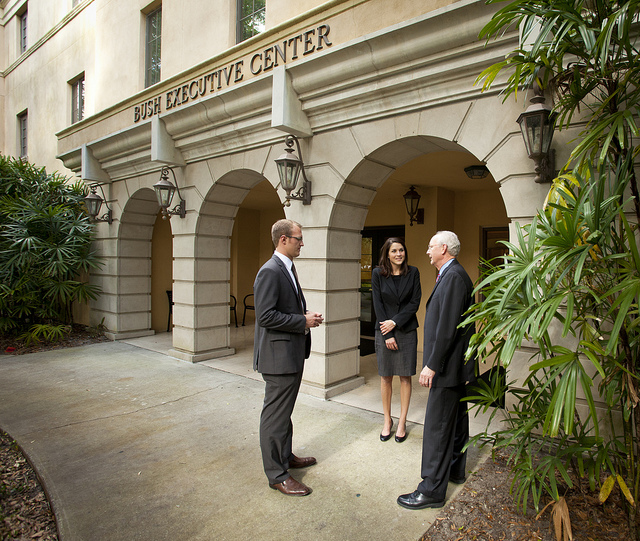Rollins offers over 30 majors, an appropriate medley for a liberal arts college, yet one department has a noticeable presence on campus: the business department. There is a total of 461 students within the department—almost a quarter of the undergraduate population. But given the rigidity of the requirements for the business majors, it is questionable if this significant portion of the Rollins community is truly receiving a liberal arts education.
When asked if he felt as though he was getting a liberal arts education, Theodore Schutz ‘18, an International Business major, responded, “probably just as much as other students because we still take the neighborhood courses like everyone else and we still connect those neighborhood courses senior year.”
Schutz expressed how he felt the International Business Major is “better aligned with Rollin’s mission of creating a global citizen because of the foreign language and international internship requirement.”
Schutz did say that his major could “be better if you could take two courses outside of the neighborhood system or had a wider variety of electives.” Likewise, he noted that during his time at Rollins an extra course was added to his major. He states, “some of the courses I took I wouldn’t have been able to take due to that extra class requirement.”
The business majors are one of the more restrictive majors on campus, each major within the department require 16-17 courses as opposed to the more standard 10-12 courses which are the typical requirement for most majors at Rollins.
Breaking down the Business Management, International Business, and Business & Social Entrepreneurship majors, each requires anywhere between 9-12 business courses and 2-4 elective courses. The business majors also require a global experience, which can be an international experience or an immersion. For International Business, foreign language and social entrepreneurship courses are also required.
This course distribution does allow for business majors to have some variety in courses and experiences during their time at Rollins; however, business students still face more restriction than those in other majors. For example, the course options available to satisfy the elective requirements are largely limited to political science, economics, and history courses. Furthermore, the variety of required courses does not change the fact that they have a larger quantity of required courses, limiting the opportunities for exploration outside of the major.
Because of the 16-17 required courses, business majors only have seventy-two credit hours available for classes outside of their major. Twenty of these are dedicated to neighborhood classes, another tactic that helps integrate business majors into the liberal arts education. This only leaves fifty-two credit hours, thirteen courses, for business majors to become the well-rounded student that a liberal arts institution desires to produce.
This difficulty for business majors to pursue interests outside their major is illustrated by the percentages of business majors that have a minor or double major. Based on data collected from the Foxlink email lists, 26-48% of majors within the business department have a minor, the lowest percentage being among Business Management majors and the highest among International Business majors. Even fewer have a double major. Only 5-20% of majors within the business department pursue a double major.
The most common majors or minors were Economics and Communication Studies. International Business majors were likely to have a major or minor in a language. The few business majors who do pursue an additional major or minor choose minors which are compatible with the requirements of their major.
Comparatively, majors with fewer required courses often allow more students to pursue a double major or minor. For example, the English major only has twelve required courses. 40% of English majors pursue a minor and 20% pursue a double major. Similarly, 78% of Philosophy majors pursue a double major and 32% of Psychology majors pursue a minor. Unlike business majors, each of these majors have a wide variety of minors and double majors, many of which are only tangentially related to the required courses of their primary major.
According to the data, business majors, unlike their peers with fewer courses, are largely not pursuing the well-rounded, diverse course load appropriate of a liberal arts education. Although the neighborhood program and some requirements of the major help counteract the restrictions these students face, it is altogether questionable whether such a streamlined major truly belongs at Rollins.







Be First to Comment